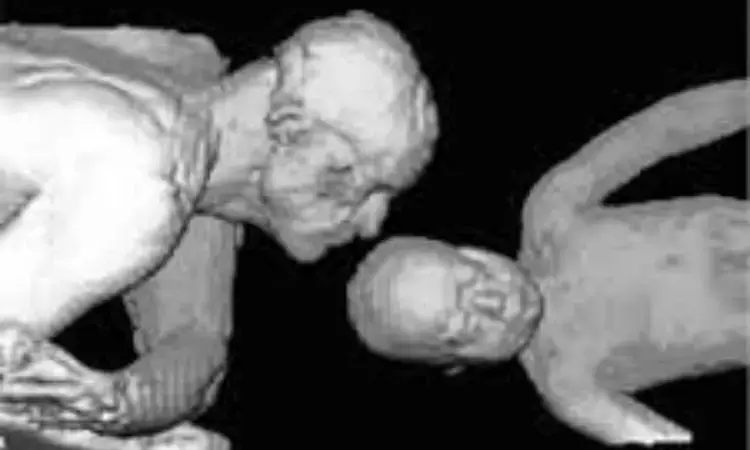- Home
- Medical news & Guidelines
- Anesthesiology
- Cardiology and CTVS
- Critical Care
- Dentistry
- Dermatology
- Diabetes and Endocrinology
- ENT
- Gastroenterology
- Medicine
- Nephrology
- Neurology
- Obstretics-Gynaecology
- Oncology
- Ophthalmology
- Orthopaedics
- Pediatrics-Neonatology
- Psychiatry
- Pulmonology
- Radiology
- Surgery
- Urology
- Laboratory Medicine
- Diet
- Nursing
- Paramedical
- Physiotherapy
- Health news
- Fact Check
- Bone Health Fact Check
- Brain Health Fact Check
- Cancer Related Fact Check
- Child Care Fact Check
- Dental and oral health fact check
- Diabetes and metabolic health fact check
- Diet and Nutrition Fact Check
- Eye and ENT Care Fact Check
- Fitness fact check
- Gut health fact check
- Heart health fact check
- Kidney health fact check
- Medical education fact check
- Men's health fact check
- Respiratory fact check
- Skin and hair care fact check
- Vaccine and Immunization fact check
- Women's health fact check
- AYUSH
- State News
- Andaman and Nicobar Islands
- Andhra Pradesh
- Arunachal Pradesh
- Assam
- Bihar
- Chandigarh
- Chattisgarh
- Dadra and Nagar Haveli
- Daman and Diu
- Delhi
- Goa
- Gujarat
- Haryana
- Himachal Pradesh
- Jammu & Kashmir
- Jharkhand
- Karnataka
- Kerala
- Ladakh
- Lakshadweep
- Madhya Pradesh
- Maharashtra
- Manipur
- Meghalaya
- Mizoram
- Nagaland
- Odisha
- Puducherry
- Punjab
- Rajasthan
- Sikkim
- Tamil Nadu
- Telangana
- Tripura
- Uttar Pradesh
- Uttrakhand
- West Bengal
- Medical Education
- Industry
Novel approach allows performing cardiac MRI in children without sedation: Study

USA: A novel approach of bringing parents into the MRI bore and positioning them head-to-head with their children may be helpful in making fidgety kids complete their cardiac MRI studies without sedation use, a recent study has found. The study findings journal appears in the European Journal of Radiology.
Cardiac magnetic resonance (CMR) is an essential part of the diagnosis of children with heart disease. Generally, patients aged six to eight years of age are examined by CMR under conscious sedation or general anesthesia (GA). This is due to their inability to cooperate with the procedure without moving around while inside the magnet bore. However, sedation comes with side effects and increases scan times and cost. Previous studies have suggested an increased risk of adverse neurodevelopmental outcomes in children exposed to GA at a young age.
Safwat Aly and Lars Grosse-Wortmann report a novel approach to scan these patients while they are awake, based on efforts to make them comfortable during the examination as well as a distraction from the test itself.
The authors developed what they called the "parent-child-combination" technique and have used it so far in 16 cardiac MRI scans in 14 patients, 14 of which were successful.
Patients are positioned supine, feet-first into the scanner, with their chest close to the isocenter of the magnet to maximize the MR signal from the receiver coils. The parent is positioned in the decubitus position facing their child, head-first into the scanner, as close to the child as possible without being in the field of view. This soothes the patient without sacrificing scan time, the authors wrote.
In one case highlighted in the series, the authors used the technique in a 2.5-year-old girl born with several heart defects. The girl had undergone biventricular repair and developed right lower and middle pulmonary vein stenosis and presented with recurrent pneumonia and chronic right pleural effusion.
The girl underwent a cardiac MRI together with her father. All images were acquired during free breathing, and pauses in scanning were minimized to shorten scan time and allow the patient to focus her attention away from the test itself, the authors explained.
The examination revealed mild narrowing of the patient's left lower pulmonary vein and of the distal right ventricle to pulmonary artery conduit. Both ventricles were dilated with reduced ejection fractions. There was collapse/consolidation of the patient's right lung and a large right pleural effusion.
The girl subsequently underwent percutaneous pulmonary valve implantation, the authors wrote.
The parent-child-combined technique is more time-consuming, but the draw on resources is likely less than when examining these patients under general anesthesia or sedation, the authors noted. Moreover, evidence suggests an increased risk of adverse neurodevelopmental outcomes in children exposed to general anesthesia at a young age, they added.
"This workflow is applicable not only to [cardiac MRI] but other indications for magnetic resonance imaging as well," the authors concluded.
Reference:
The study titled, "A novel approach to cardiovascular magnetic resonance imaging in young children without sedation," is published in the European Journal of Radiology.
DOI: https://www.ejradiology.com/article/S0720-048X(21)00486-1/fulltext
Dr Kamal Kant Kohli-MBBS, DTCD- a chest specialist with more than 30 years of practice and a flair for writing clinical articles, Dr Kamal Kant Kohli joined Medical Dialogues as a Chief Editor of Medical News. Besides writing articles, as an editor, he proofreads and verifies all the medical content published on Medical Dialogues including those coming from journals, studies,medical conferences,guidelines etc. Email: drkohli@medicaldialogues.in. Contact no. 011-43720751


